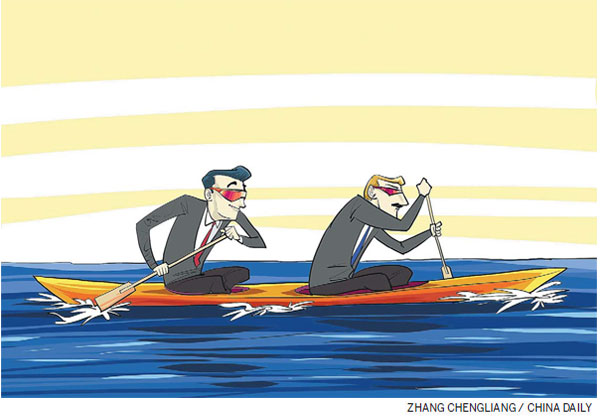The way forward for China's industry
Updated: 2015-04-17 07:01
By Mike Bastin(China Daily Europe)
|
|||||||||||
To expand globally, Chinese companies must consolidate to create corporations with commercial muscle
Industry competitiveness on an international scale almost always requires a critical mass of a group of small to medium-sized industry competitors or a fast-growing, acquisitive larger industry player. Emerging market economies that have produced global competitors have often followed the former path, such as Japan with its Keiretsu industry clusters and South Korea with its Chaeobol groupings of family-owned business. The likes of no lesser corporate brands than Sony and more recently Samsung have emerged onto the world stage as a result.
But perhaps the way forward for the internationalization of Chinese industry, especially the state-owned sector, requires industry consolidation to create a single corporate structure. This structure would have sufficient critical mass and commercial muscle to expand internationally.

Recent mergers and restructuring within the Chinese railway and nuclear power sectors would suggest this path is already being pursued.
Recently the final go-ahead began for the merger of China's two nuclear giants, China Power Investment Corp and State Nuclear Power Technology Corp (which was first raised in April 2014). This should lead to a far more internationally competitive corporation with sufficient size and financial clout to attract further investment and expand overseas via a multitude of market entry strategies from partnerships and alliances to full-blown takeovers.
It was also announced recently that a similar consolidation is now imminent in the Chinese railway industry, with China North Railways and China South Railways set to merge soon. This restructuring is aimed at building a single corporation that carries considerably more commercial power, with international expansion being the immediate and long-term vision.
Indeed, expansion into Europe across industrial sectors, hitherto regarded as a "sacred cow" of the state-owned sector, is now a real possibility. Not only are public sector market opportunities more and more open across Europe, but overseas investment is more and more needed.
In fact, it was only last year that the European Commission, the European Union's executive body, cleared a 1.74 billion pound ($2.7 billion) takeover of a British rail technology company by German industrial conglomerate Siemens.
In so doing, the European Commission, which acts as the 27-nation bloc's competition watchdog, has not only signaled an openness to increased competition in the European railway sector but also openness to investment from unrelated industrial sectors. The European Commission has also made it clear that such private investment does not have to be sourced from inside the EU and that European public sector companies can reap considerable benefits, in the short and long term.

The British government's more recent privatization of the Royal Mail provides further, demonstrable proof that Europe's public sector is more open to overseas business interests.
Clearly, the European railway and related sectors could gain substantially with the formation of some long-term partnerships and investment, and Chinese state-owned enterprises are now well-positioned to make this happen.
Cross-border partnerships and investment opportunities across Europe's nuclear power industry are also areas in which Chinese SOEs are now in a better position to deliver assistance.
At present, nine European countries are either in the process of building new nuclear reactors or have plans to do so in the near future.
Many Eastern European nations have the most ambitious and expansive plans and perhaps present areas of the greatest cross-border partnership potential.
But the recent mergers across China's railway and nuclear power sectors should not be seen by potential public sector partners in Europe as one-offs or stand-alone initiatives aimed at stimulating overseas expansion within these sectors specifically. Rather, European industry should see this as the start of a wave of Chinese SOE consolidation, across all industrial sectors, with international expansion, cooperation and collaboration as the aim.
The sweeping initiative, led by China's central government and branded "Made in China 2025", focuses almost entirely on key public sectors and overseas market development.
European industries, especially public and quasi-public sectors, should take note of this long-term restructuring plan that lies behind recent Chinese government SOE consolidation initiatives.
European companies should become very familiar with the extent of this Chinese SOE restructuring and reform plan. According to recent government press releases, this far-reaching plan will address issues ranging from the establishment of asset management companies to oversee state shareholding, to the introduction of non-state investments and performance-based compensation mechanisms at government-controlled firms.
Improving the efficiency at SOEs, which dominate crucial sectors of China's economy, is seen as critical to sustainable Chinese economic growth, but it is only recently that the Chinese central government has signaled international cooperation, collaboration and expansion as the way forward for the state sector.
In addition to the recent railway and nuclear power industry consolidation initiatives, China's central government is also likely to use mergers to create international expansion opportunities in the shipbuilding, electronics and construction sectors.
Merger plans are already underway at China State Shipbuilding Corp and China Shipbuilding Industry Corp, according to industry insiders and local Chinese media reports.
China's oil and gas industries are also likely to undergo some asset restructuring and should also lead to increased international opportunities.
Media reports, therefore, that present these mergers as a possible step backwards and a signal that reform across China's SOE sectors is drawing to an end are misguided.
It is also simplistic to assume that consolidation, particularly within the state sector, will inevitably lead to increased bureaucracy and inefficiency. Rather, in this case, the firm focus on international expansion and development should produce increased competitiveness and more market-oriented SOEs.
Indeed it is the outward, overseas orientation and drive that is key here and that justifies the nature of this reform.
Mergers, especially those across the state sector, that lack international expansion objectives may well stumble. But in these two recent cases, both the railways and nuclear power sector mergers are predicated on overseas growth and rapid and imminent expansion.
Such an acquisitive and aggressive approach to global growth can only lead to the emergence of a more market-oriented corporate culture that bears close similarities to the typical private sector ethos.
Going global in this fashion is also highly likely to allow for the acquisition of more modern business management across very different business and national cultures, which can only help in the overall modernization process for Chinese SOEs.
Without mergers of this nature, it is also highly unlikely that any form of significant international expansion activity could be considered feasible.
Paradoxically, it may well be the case that globalization and international market opportunities present the right route for the domestic modernization and reform of many of China's SOEs and this can only be achieved via consolidation through mergers and alliances.
The author is a visiting professor at the University of International Business and Economics in Beijing and a senior lecturer in marketing at Southampton Solent University's School of Business. The views do not necessarily reflect those of China Daily.
(China Daily European Weekly 04/17/2015 page11)
Today's Top News
AIIB to operate in 'transparent way'
PLA to buy advanced missiles from Russia
EU accuses Google of hurting consumers, competitors
Q1 economic data: what the economists say
Holocaust memories to live on
Problem-plagued Milan Expo battles a long list of headaches
Foreign ministers call for end to fighting in east Ukraine
Spotlight set to shine on royal sibling
Hot Topics
Lunar probe , China growth forecasts, Emission rules get tougher, China seen through 'colored lens', International board,
Editor's Picks

|

|

|

|

|

|






